2020秋九年级英语上册 Unit 4《Stories and poems》重点单词和短语解析 (新版)冀教版
九年级英语上册Unit4StoriesandPoems语法聚焦四新版冀教版-经典通用课件材料

Unit 4 Stories and Poems1. One day the children were playing in the garden when a giant appeared. 一天,孩子们正在花园里顽耍,这时分分一个巨人出现了。
2. It was wearing a big yellow hat.它戴着一顶黄色的大帽子。
3. He thought it must be the king's musicians passing by.他想必然是国王的乐师们正在经过。
4. I think a good story must have great characters and an interesting plot.我认为一个好故事必须有重要的人物和一个风趣的情节。
一、过去进行时1. 定义过去进行时表示在________某一时辰或某一工夫段内________发生或进行的动作。
2. 结构主语+________/________+________+其他3. 工夫状语常用的工夫状语有at five yesterday, the whole morning, when/while 引导的工夫状语从句。
二、must 的用法1. must 是________动词,后面要接实义动词或be动词的原形。
2. must 意为“必须”,mustn't 意为“不准;禁止”。
3. must 还可以用来表示揣测,意为“________”,用于肯定句,表示较大可能的揣测。
否定的揣测要用can't, 意为“________”。
4. 留意:(1)must构成的普通疑问句的回答:肯定回答用must,否定回答用needn't或don't have to。
—Must I leave now?—Yes, you must./No, you need't./No, you don't have to.(2)must 强调主观上认为“必须”做的事; have to 强调客观上“不得不”做的事。
九年级英语上册Unit4 Stories and poems Lesson19 A Story or
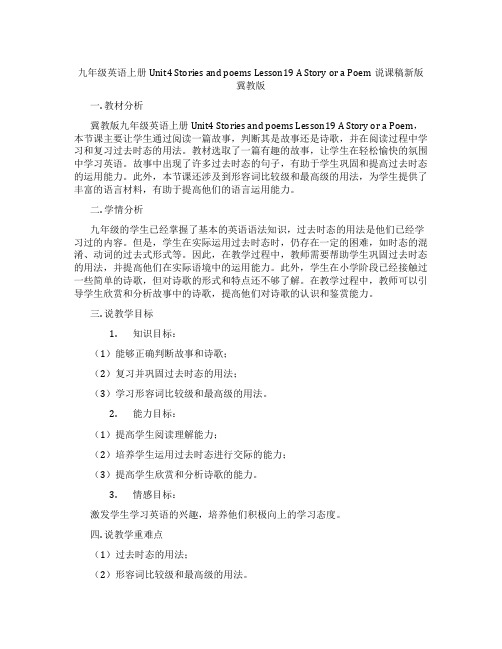
九年级英语上册Unit4 Stories and poems Lesson19 A Story or a Poem说课稿新版冀教版一. 教材分析冀教版九年级英语上册Unit4 Stories and poems Lesson19 A Story or a Poem,本节课主要让学生通过阅读一篇故事,判断其是故事还是诗歌,并在阅读过程中学习和复习过去时态的用法。
教材选取了一篇有趣的故事,让学生在轻松愉快的氛围中学习英语。
故事中出现了许多过去时态的句子,有助于学生巩固和提高过去时态的运用能力。
此外,本节课还涉及到形容词比较级和最高级的用法,为学生提供了丰富的语言材料,有助于提高他们的语言运用能力。
二. 学情分析九年级的学生已经掌握了基本的英语语法知识,过去时态的用法是他们已经学习过的内容。
但是,学生在实际运用过去时态时,仍存在一定的困难,如时态的混淆、动词的过去式形式等。
因此,在教学过程中,教师需要帮助学生巩固过去时态的用法,并提高他们在实际语境中的运用能力。
此外,学生在小学阶段已经接触过一些简单的诗歌,但对诗歌的形式和特点还不够了解。
在教学过程中,教师可以引导学生欣赏和分析故事中的诗歌,提高他们对诗歌的认识和鉴赏能力。
三. 说教学目标1.知识目标:(1)能够正确判断故事和诗歌;(2)复习并巩固过去时态的用法;(3)学习形容词比较级和最高级的用法。
2.能力目标:(1)提高学生阅读理解能力;(2)培养学生运用过去时态进行交际的能力;(3)提高学生欣赏和分析诗歌的能力。
3.情感目标:激发学生学习英语的兴趣,培养他们积极向上的学习态度。
四. 说教学重难点(1)过去时态的用法;(2)形容词比较级和最高级的用法。
(1)过去时态在实际语境中的运用;(2)诗歌的形式和特点。
五. 说教学方法与手段1.教学方法:(1)情境教学法:通过设置情境,让学生在实际语境中运用过去时态;(2)任务型教学法:引导学生完成阅读任务,提高他们的阅读理解能力;(3)欣赏教学法:引导学生欣赏和分析故事中的诗歌,提高他们对诗歌的认识和鉴赏能力。
九年级英语上册Unit4StoriesandPoemsLesson21TheFableoftheWo
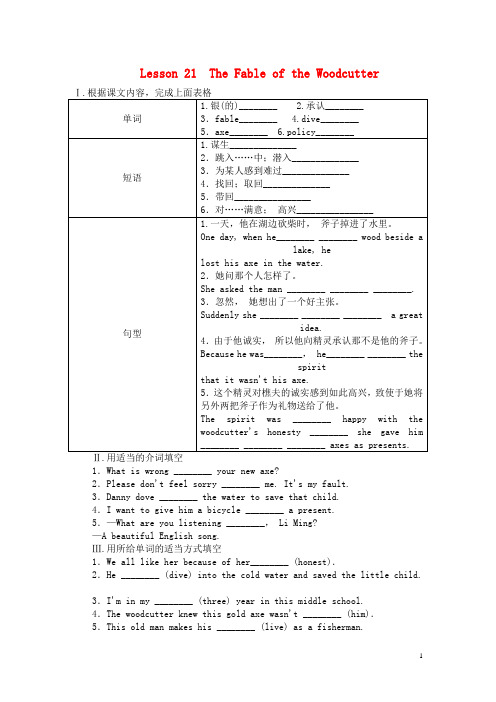
Lesson 21 The Fable of the Woodcutter1.What is wrong ________ your new axe?2.Please don't feel sorry ________ me. It's my fault.3.Danny dove ________ the water to save that child.4.I want to give him a bicycle ________ a present.5.—What are you listening ________, Li Ming?—A beautiful English song.Ⅲ.用所给单词的适当方式填空1.We all like her because of her________ (honest).2.He ________ (dive) into the cold water and saved the little child.3.I'm in my ________ (three) year in this middle school.4.The woodcutter knew this gold axe wasn't ________ (him).5.This old man makes his ________ (live) as a fisherman.Ⅳ.单项填空( )1.Tom is a(n) ________ farmer and he never tells lies.A.honest B.carefulC.happy D.clever( )2.Look! Miss Li has a big smile on her face; she must be ________ with what he did.A.mad B.happyC.angry D.surprised( )3. The teacher came into the classroom, ________ a history book in his hand.A.to hold B.holdingC.hold D.to holding( )4.The boy admitted ________ his mother that he broke the glass.A.to B.withC.for D.in( )5.—Mr. Li, I have repaired your TV. You can ________ it ________ now.—Thanks a lot.A.put; back B.go; backC.get; back D.pick; back( )6. My grandfather has three sons. One son is in Beijing while __________ are in the U.S.A. the otherB. two anotherC. the other twoD. the others two( )7. —I hear your friend is visiting Sanya again. Is it the second time for him?—Yes, and he will come for ________ time next spring.A.a third B.secondC.the third D.three( )8.Tom ________ the yard when I passedby.A.cleaned B.was cleaningC.is cleaning D.cleansⅤ. 完形填空Once upon a time, the colours of the world argued.Green said, “Clearly I am the most important. I am the sign of __1__ and hope. I am the colour of grass, trees and leaves. __2__ me, all animals would die.” __3__ said loudly, “What is the colour of the sky and the sea? Isn't water the most important thing for life?” Yellow laughed, “I bring laughter, happiness and warmth into the world. Every time people look at a __4__, they start to smile. Without me there would be no fun.” Orange said at the top of his voice, “I am the colour of health and strength. Think of carrots, pumpkins(南瓜) and oranges. When I fill the sky at __5__ or sunset, everyone is __6__ at my beauty.” Red could __7__ it no longer, so he shouted, “I amthe colour of danger and bravery. I give people courage.” The colours went on __8__. Their voices became louder and louder. The thunder(雷) got angry and the __9__ started to pour. When the colours began to cool, the rain said, “You foolish colours! Don't you know that each of you is special? __10__ hands and follow me.” They did what they were told and together made the most beautiful rainbow(彩虹).( )1.A.sadness B.happinessC.illness D.life( )2.A.Unlike B.WithoutC.Except D.Including( )3.A.Green B.YellowC.Blue D.Orange( )4.A.sunflower B.cloudC.star D.river( )5.A.noon B.rainstormC.evening D.sunrise( )6.A.shocked B.terrifiedC.ashamed D.encouraged( )7.A.hear B.enjoyC.stand D.receive( )8.A.saying B.talkingC.shouting D.arguing( )9.A.snow B.windC.rain D.storm( )10.A.Take B.JoinC.Connect D.CatchⅥ. 2017·泸州浏览理解On a wild mountain, two goats met on a road just over a high cliff(悬崖). The road was so narrow(狭窄) that there was neither room for them to pass each other nor to turn round and go back. What do you think the two goats did?One of them with great care laid himself down on the narrow road, pressing as close to the rock as he could. Then the other goat softly walked on his friend, till, safely past him, he could lightly jump away.The goat that had lain down then stood up slowly from his place, safe and sound, free to jump again from rock to rock, and enjoyed the sweet grass on the hills happily.However, two other goats met on the banks(河岸) of a rushing river. A tree had fallen across the river, and became a bridge from the one side to the other.The two goats looked at each other, and each wished to pass over first.They stood for a while with one foot on the tree, each thinking—that the other would turn back. But neither of them would give way, and they met at last on the middle of the narrow bridge!They then began to push and fight with their horns(角), till at last their feet missed, and both the goats fell into the running river, and were lostin the water!Both might have been saved, if either of them had known how to give way at the right time.( )1.Where did the first two goats meet?A.On the hills.B.On a bridge.C.On a narrow road.D.At the bank of river.( )2.How did they pass the narrow road safely?A.By lying down.B.By working together.C.By jumping away.D.By pressing to the rock.( )3.What was the bridge made of?A.A tree. B.A stone.C.Some stones. D.Some trees.( )4.What happened when they met on the middle of the bridge?A.They pushed and fought.B.They lay on the bridge.C.They looked at each other.D.They stood on the bridge.( )5.The passage tells us that ________.A.we should face the challenge in lifeB.we should be careful to cross the bridgeC.we should give way to others at right timeD.we should be brave to climb the mountains教师详解详析Ⅰ.单词: 1.silver 2.admit 3.寓言4.跳水;俯冲 5.斧子6.准绳;政策短语: 1.make one's living 2.dive into3.feel sorry for sb. 4.get back5.bring back 6.be happy with句型: 1.was cutting2.what was wrong3.came up with4.honest; admitted to5.so; that; the other twoⅡ.1.with 2.for 3.into 4.as 5.toⅢ.1.honesty 2.dove/dived 3.third4.his 5.livingⅣ.1.A 2.B 3.B 4.A 5.C6.C 7.A8.B 句意:当我经过时,汤姆正在打扫院子。
九年级英语上册Unit4StoriesandpoemsLesson24WritingaPoem课件新
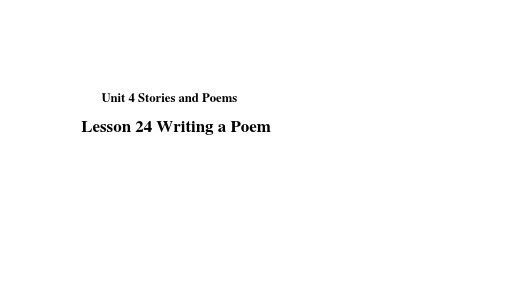
(4)prefer to do A rather than do B表示“宁愿做A而不愿做B”。
be always doing sth.意为“总是做某事”
Use “must” to complete the dialogues. Then practice the dialogues with a partnesth.意为“害怕做某事”。
Prefer: (1)prefer sth.表示“更喜欢某物”。 (2)prefer to do sth.表示“宁愿做某事”。 (3)prefer(doing)A to(doing)B表示“比起(做)B来更喜欢(做)A”,其
Which do you prefer to write, poems or stories? Why?
fairy tale
character
plot humorous
n. 仙子;小精灵 n. 故事;童话 n. (小说、戏剧当中 的)人物;特点;特色 n. 情节 adj. 幽默的;诙谐的
Read the lesson and write true (T) or false (F).
Do you know any poems that describe a lake?
Do you know any poems that describe the spring?
Do you know any poems that describe the snow?
Do you know any poems that describe the study?
Writing:
Use each letter in this word to begin a line of your poem.
2020九年级英语上册 Unit 4 Stories and Poems整体分析、话题相关链接素材 (新版)冀教版

Unit 4 Stories and PoemsPeople invented poetry as a help to remember things. Before the invention of words there were no other ways but to remember important things in mind. People early discovered that rhyme and rhythm were very helpful when they were trying to remember things. So they made poems to help them remember all the things they needed to know and pass on from generation to generation. For example, to remember their history, they recited great stories about their ancestors and the wars that were fought. But people also needed to remember practical things such as where to find good caves to sleep, where to find water that could be drunk or when to plant crops.We no longer need poetry to remember things. But that doesn't mean that we shouldn't or couldn't use it to help us remember and learn things better. In fact, there are a number of quite famous short poems that can help us with things that are difficult to remember.We can learn and remember important dates in history using rhyme. The most famous of these is, “In fourteen ninetytwo, Columbus sailed the ocean blue.” It's used to remember that it was in 1492 that Columbus discovered America. We can even learn how to spell English words from a short poem. It is very useful to help students learn and remember how to spell some difficult words in English and it always works.。
2020九年级英语上册 Unit 4 Stories and poems Lesson 24 Writing a Poem教案
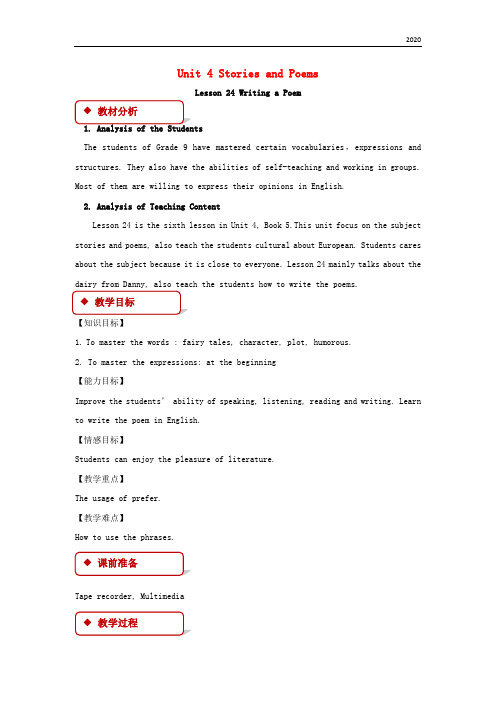
Unit 4 Stories and PoemsLesson 24 Writing a PoemThe students of Grade 9 have mastered certain vocabularies,expressions and structures. They also have the abilities of self-teaching and working in groups. Most of them are willing to express their opinions in English.2. Analysis of Teaching ContentLesson 24 is the sixth lesson in Unit 4, Book 5.This unit focus on the subject stories and poems, also teach the students cultural about European. Students cares about the subject because it is close to everyone. Lesson 24 mainly talks about the dairy from Danny, also teach the students how to write the poems.【知识目标】1.To master the words : fairy tales, character, plot, humorous.2. To master the expressions: at the beginning【能力目标】Improve the students’ ability of speaking, listening, reading and writing. Learn to write the poem in English.【情感目标】Students can enjoy the pleasure of literature.【教学重点】The usage of prefer.【教学难点】How to use the phrases.Tape recorder, MultimediaStep 1. Warm-upFree talk: Look at the picture, what happened?Step 2. Presentation1.Read the passage and ask the questions:(1)What’s the difference between poem and story?(2)Does Danny afraid to write a poem?2.Think about it: Which do you prefer to write? Poems or stories? Why? What about Danny?3.Explain the new words.4.Read the lesson and write true (T) or false (F).(1)Danny learned how to write songs last week. ( )(2)Danny likes reading stories. ( )(3)Danny thinks stories are easier to write. ( )nguage points:at the beginning “开始时;起初”,at也可以换成in。
【冀教版】2020学年英语九年级上册:unit4单元练习含答案

Unit4 Stories and Poems单元练习一、听力(听力)(共20小题;共20分)听力部分(20分)Ⅰ.听句子,选出该句的最佳答语。
(5分)1. A. It's a pity. B. That's wonderful. C. Thank you.2. A. Thank you. Some apples please.B. It doesn't matter.C. I've no idea.3. A. It's very bright.B. Very beautiful.C. Thank you. I like it very much.4. A. I think so.B. I have a great idea.C. It's very kind of you.5. A. It's so delicious.B. No, thank you. I've had enough.C. Here you are.Ⅱ.听对话和问题,选择正确答案。
(5分)6. A. They are hard.B. They are different.C. They are difficult to use.7. A. Dumplings. B. Tea. C. Nothing.8. A. At school. B. At his friend's. C. At home.9. A. At the restaurant. B. At the supermarket. C. At the station.10. A. To make a beautiful kite for her.B. To buy a new kite for her.C. To get her kite down from the tree.Ⅲ.听语段、对话和问题,选择正确答案。
九上英语《The Fable of the Woodcutter》Stories and Poems
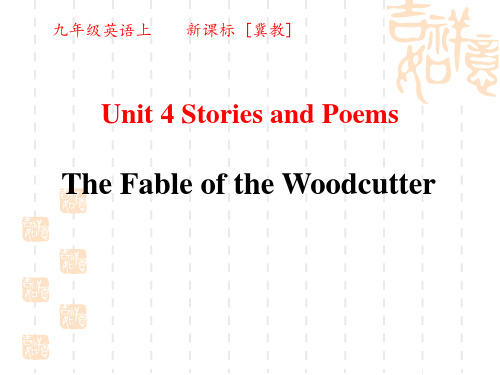
范文下载:/fanwen/
试卷下载:/shiti/
教案下载:/jiaoan/
PPT论坛:
PPT课件:/kejian/
语文课件:/kejian/yuw en/ 数学课件:/kejian/shuxue/
animals,
plants, PPT模板:/moban/
PPT素材:/sucai/
PPT背景:/beijing/
PPT图表:/tubiao/
PPT下载:/xiazai/
PPT教程: /powerpoint/
资料下载:/ziliao/
英语课件:/kejian/ying yu/ 美术课件:/kejian/me ishu/
科学课件:/kejian/kexue/ 物理课件:/kejian/wul i/
化学课件:/kejian/huaxue/ 生物课件:/kejian/she ngwu/
presents. 本句为“so…that”句型,意为“如此……以
致……”,常引导结果状语从句。so后接形容词或 副词,此句型可以转换成简单句,即可转换为 “…enough to…”或“too…to…”句型。
13. Honesty truly is the best policy. honesty是honest的名词形式,意为“诚 实”;dishonest为honest的反义词,意为“不诚实 的”。
2 poor
helpful clever honest foolish
warmhearted dishonest
kind
poor
☆教材解读☆
1. One day,when he was cutting wood beside a
lake,he lost his axe in the water. 本句为过去进行时态,句子结构为刻正在发生 的事情”。 2. The water was deep,and he could not get his axe
【初中教育】2020九年级英语上册Unit4StoriesandPoems教案新版冀教版
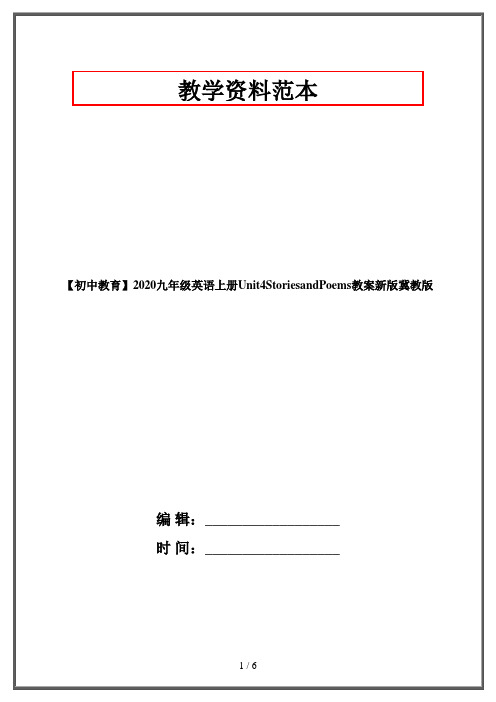
【20xx精选】最新九年级英语上册Unit4StoriesandPoems教案新版冀教版Lesson 19: A Story or a Poem?【20xx精选】最新九年级英语上册Unit4StoriesandPoems教案新版冀教版Master the new words:II。
Learning important and difficult points: 1) I haven’t decided which one to write yet。
4) I described something I love。
Language Points:1。
I haven’t decided which one to write yet。
我还没有决定该写哪一个。
【用法】句中的which one to write是“疑问词 + 不定式”结构用在动词decide后作宾语。
不定式可以与疑问词who, what, which, when, how, where 等连用,构成不定式短语,在句中作主语、表语、宾语和宾语补足语等。
【举例】We don’t believe they can keep up with us。
我相信他们是不会赶上我们的。
3。
I described something I love。
我描写了一些我喜欢的东西。
【用法】句中的I love是定语从句,用在不定代词something 之后作定语,前面省略了关系代词that。
【举例】She cooked something (that) we liked to eat。
她做了一些我们喜欢吃的东西。
Lesson 20: Say It in FiveI。
Learning aims:Master the new words:line, text, poet, single, screen, stretch, liquid, state, noun, adjective, verb, expressII。
冀教版英语九年级上册《Unit 4 Stories and Poems》单元知识点归纳

Unit 4重点单词和短语解析单词1. aloud作副词,意为“出声地、大声地”,多用在动词后作状语。
如:We could hear it all the time though nobody said it aloud. 尽管没人大声说出来,但孩子们时时都能听到。
2. line作可数名词,意为“行、线路、线”,复数形式是lines。
如:How many lines does this poem have? 这首诗有多少行?短语in line意为“成一条线”,多在句中作状语或表语。
如:You should wait in line when waiting for the bus. 你在等车时应该排队等候。
3. state作及物动词,意为“陈述、说明”,后加名词或代词作宾语。
如:How can you state this matter in another way? 你如何用另一种方法陈述一下这个事情?作可数名词,意为“州、状态、国家”,复数形式是states。
如:The U.S. has fifty states. 美国有五十个州。
4. spirit作可数名词,意为“精灵”,复数形式是spirits。
如:hey all call her the little spirit. 他们都把她叫做小精灵。
作不可数名词,意为“精神”。
如:We should learn this spirit in our work. 我们应该在工作中学习这种精神。
5. silver作不可数名词,意为“银、银”。
如:This bowl is made of silver. 这个碗是银制的。
作形容词,意为“银的”,在句中作定语或表语。
如:Wang Hong won the silver medal in the game. 王红在比赛中获得了银牌。
6. lie作不及物动词,意为“躺、平放、位于、撒谎”,注意,作“撒谎”讲时,过去式、过去分词是lied, lied,作其他含义讲时,过去式、过去分词是lay, lain;它的现在分词都是lying。
九年级英语上册Unit4StoriesandpoemsLesson24WritingaPoem【DOC范文整理】
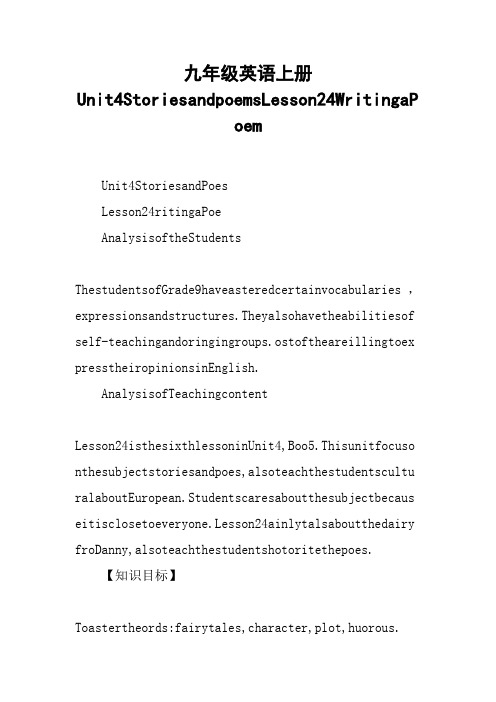
九年级英语上册Unit4StoriesandpoemsLesson24WritingaPoemUnit4StoriesandPoesLesson24ritingaPoeAnalysisoftheStudentsThestudentsofGrade9haveasteredcertainvocabularies,expressionsandstructures.Theyalsohavetheabilitiesof self-teachingandoringingroups.ostoftheareillingtoex presstheiropinionsinEnglish.AnalysisofTeachingcontentLesson24isthesixthlessoninUnit4,Boo5.Thisunitfocuso nthesubjectstoriesandpoes,alsoteachthestudentscultu ralaboutEuropean.Studentscaresaboutthesubjectbecaus eitisclosetoeveryone.Lesson24ainlytalsaboutthedairy froDanny,alsoteachthestudentshotoritethepoes.【知识目标】Toastertheords:fairytales,character,plot,huorous.Toastertheexpressions:atthebeginning【能力目标】Iprovethestudents’abilityofspeaing,listening,readingandriting.Learnto ritethepoeinEnglish.【情感目标】Studentscanenjoythepleasureofliterature.【教学重点】Theusageofprefer.【教学难点】Hotousethephrases.Taperecorder,ultiediaStep1.ar-upFreetal:Looatthepicture,hathappened?Step2.PresentationReadthepassageandasthequestions:hat’sthedifferencebeteenpoeandstory?DoesDannyafraidtoriteapoe?Thinaboutit:hichdoyouprefertorite?Poesorstories?hy? hataboutDanny?Explaintheneords.Readthelessonandritetrueorfalse.Dannylearnedhotoritesongslastee.Dannyliesreadingstories.Dannythinsstoriesareeasiertorite.Languagepoints:atthebeginning“开始时;起初”,at也可以换成in。
2020版九年级英语全册Unit4StoriesandpoemsLesson23TheGiantⅡ课件(新版)冀教版

C. put away
D. put down
要点2 ever since 自从, 从……起; 自从……以后 Step 1难点·探 (1)ever since 用在什么时态的句子中? (2)ever since, ever since then, since then, since 的区别 是什么?
Step 3知识·得 ever since, ever since then, since then, since
Step 4考点·练 ①从那时起, 他再也没有出现过。 He _h_a_s_n_’t_ _a_p_p_e_a_r_e_d_any longer _e_v_e_r _s_in_c_e_ then. ( B )②(2018·黔南州中考)Jack has learned more about teamwork(团队合作) ________he joined the soccer team. A. until B. since C. while D. though
4. 当孩子们看见巨人, 他们是如此害怕以至于跑掉了, 花园又变回了冬天。 _W__h_e_n_ the children saw the giant, they were _s_o scared _th__a_t they all ran away, and the garden _tu__rn__ed_ _t_o winter again.
(2)put up的一词多义
【拓展】由put构成的常用短语
*The meeting was put off because of the heavy snow. 由 于这场大雪, 会议推迟了。 *Far water does not put out near fire. 远水救不了近火。 *Some animals are put into the cages. 一些动物被放在了笼子里。
2020版初中英语九年级全册Unit4 Stories and poems Lesson20SayItinFive
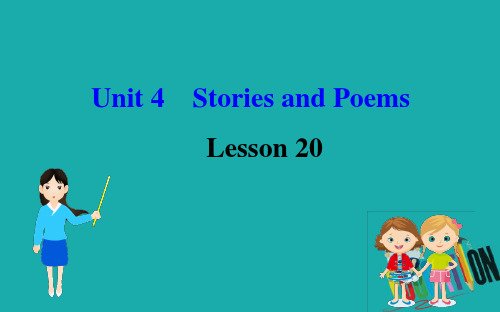
Ⅰ. 根据汉语提示写出下列单词或短语
1. 正文; 文字材料
n. _t_ex_t_
2. 屏幕; 荧光屏
n. _s_cr_e_e_n_
3. 伸展
v. _st_r_e_tc_h_
4. 清澈的; 晶莹的; 液体adj&ner of 一定数量的 Step 1难点·探 (1)a set number of后跟名词的什么形式? (2)a set number of在句中作主语时, 谓语动词用什么形 式?
Step 2语境·悟 *Each line has a set number of words. 每一行都有固定数量的单词。 (P52) *I have collected a set number of stamps. 我已经收集了一定数量的邮票。
( D )②(2018·眉山中考)—How many ________ doctors are there in your hospital, David? 世纪金榜导学号 — ________them ________over one hundred. A. woman; The number of; is B. women; A number of; are C. woman ; A number of; is D. women; The number of; is
6. 用一个词说明你的诗的主题。 _I_n_o_n_e_w_o_r_d__, state the topic of your poem.
Ⅲ. Read the text and answer the questions 1. Who was the five-line poem created by? _A__n_A__m_e_r_i_ca_n__p_o_e_t_. _ 2. How many words are there in a five-line poem? __E_l_ev_e_n_._
九年级英语上册Unit4StoriesandPoemsLesson19AStoryoraPoem同步
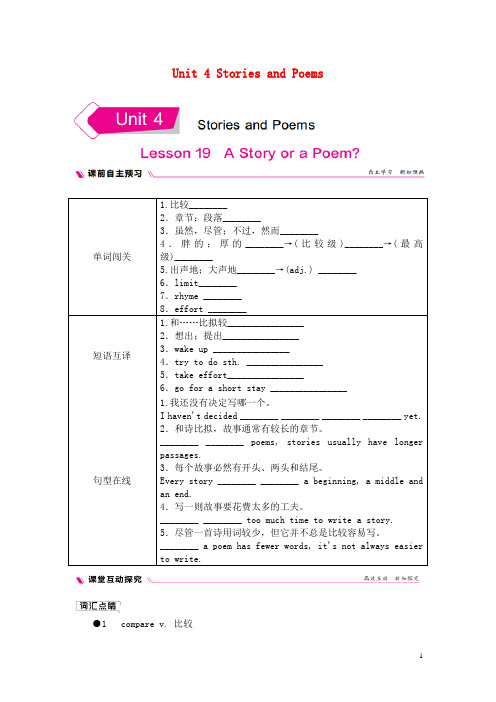
Unit 4 Stories and Poems句型在线1.我还没有决定写哪一个。
I haven't decided ________ ________ ________ ________ yet. 2.和诗比拟,故事通常有较长的章节。
________ ________ poems, stories usually have longer passages.3.每个故事必然有开头、两头和结尾。
Every story ________ ________ a beginning, a middle and an end.4.写一则故事要花费太多的工夫。
________ ________ too much time to write a story. 5.尽管一首诗用词较少,但它并不总是比较容易写。
________ a poem has fewer words, it's not always easier to write.●1 compare v. 比较单词闯关1.比较________2.章节;段落________3.虽然,尽管;不过,然而________4.胖的;厚的________→(比较级)________→(最高级)________5.出声地;大声地________→(adj.) ________ 6.limit________ 7.rhyme ________ 8.effort ________短语互译1.和……比拟较________________ 2.想出;提出________________ 3.wake up ________________4.try to do sth. ________________ 5.take effort________________6.go for a short stay ________________[观察] Compared with poems, stories usually have longer passages. 和诗比拟,故事通常有较长的章节。
九年级英语上册Unit4 Stories and poems Lesson24 Writing a

九年级英语上册Unit4 Stories and poems Lesson24 Writing a Poem教学设计新版冀教版一. 教材分析冀教版九年级英语上册Unit4 Stories and poems Lesson24 Writing a Poem是一个写作课。
本课的主题是学习写一首诗,通过欣赏和分析不同类型的诗歌,让学生掌握诗歌的基本结构和修辞手法,并能够创作一首属于自己的诗歌。
教材内容丰富,包括不同风格的诗歌示例、诗歌创作技巧指导和学生的创作实践。
二. 学情分析九年级的学生已经具备了一定的英语基础,能够理解和运用一些基本的英语句型和词汇。
然而,诗歌创作对于他们来说可能是一个新的挑战,需要引导学生充分发挥想象力和创造力。
此外,学生可能对诗歌的修辞手法和结构有一定的陌生感,因此需要教师在教学中进行详细的讲解和示范。
三. 教学目标1.能够理解并运用诗歌中的常用词汇和句型。
2.能够欣赏并分析不同类型的诗歌,理解诗歌的基本结构和修辞手法。
3.能够创作一首属于自己的诗歌,展示想象力和创造力。
4.培养对英语诗歌的兴趣和鉴赏能力。
四. 教学重难点1.诗歌中的修辞手法和结构的理解。
2.学生创作诗歌的能力的培养。
五. 教学方法1.任务驱动法:通过设定具体的写作任务,引导学生主动学习和参与。
2.案例分析法:通过分析不同类型的诗歌案例,让学生理解和掌握诗歌的基本结构和修辞手法。
3.互动式教学法:通过教师与学生、学生与学生之间的互动,激发学生的学习兴趣和创造力。
六. 教学准备1.准备不同类型的诗歌案例,包括示例和分析。
2.准备诗歌创作技巧的指导资料。
3.准备写作任务的要求和评价标准。
七. 教学过程1.导入(5分钟)通过展示一首美丽的英文诗歌,引发学生对诗歌的兴趣,并引导学生思考诗歌的特点和魅力。
2.呈现(10分钟)呈现不同的诗歌案例,让学生欣赏和分析。
引导学生关注诗歌的主题、结构、修辞手法等,并通过讨论和分享,让学生表达对诗歌的理解和感受。
2020九年级英语上册 Unit 4 Stories and poems Lesson 20 Say It In Five教案

Unit 4 Stories and PoemsLesson 20 Say It In Five1. Analysis of the Students The students of Grade 9 have mastered certain vocabularies, expressions and structures. They also have the abilities of self-teaching and working in groups. Most of them are willing to express their opinions in English.2. Analysis of Teaching ContentLesson 20 is the second lesson in Unit 4, Book 5.This unit focus on the subject stories and poems, also teach the students cultural about European. Students cares about the subject because it is close to everyone. Lesson 20 mainly talks about the rules of the five-line poems, It follows a 1-2-3-4-1 pattern.【知识目标】To master the words: line, text, single, screen, state, express1.To master the phrases: a set number of, another two, in one word, in the nineteenth century 【能力目标】Enjoy literature and try to write their own poems.【情感目标】Learn about some of the literary.【教学重点】To master the phrases.【教学难点】Write a poem in English.Tape recorder, MultimediaStep 1. Warm-up1. Free talk:Teacher show two pictures of poems in Chinese, and ask students: Do Chinese old poems follow a pattern?2.Show a poem “Brother” in English to elicit five-line poem. Then answer the questions:(1)How many lines?(2)Translate the poem.Step 2. Presentation1.Match and complete the format of a five-line poem. By the five-line poem below.2.Check the answers.3.Enjoy and read the five-line poems on page 52. ( T: How about another poems? Let’s see!)4.Explain the new words.5.Listen to the passage and answer the questions:(1)Where are five-line poems from?(2)What are they about?(3)Where is the topic in a five-line poem?6.Check the answers through train game.7.Explain the language points:in the nineteenth century意为“在19世纪”=in the 1800s。
2020九年级英语上册 Unit 4 Stories and poems Lesson 23 The Giant(Ⅱ)教案

2020Unit 4 Stories and PoemsLesson 23 The Giant (Ⅱ)1. Analysis of the Students2. Analysis of Teaching Content【知识目标】1.To master the words: peek, softly, scene, crawl, selfish, knock, spread, neck,2. To master the expressions: break out in blossom, stretch out, ever since 【能力目标】Improve the students’ability of speaking, listening, reading and writing. Students can understand the fairy tales well.【情感目标】Students can enjoy the pleasure of literature.【教学重点】Read a few old Chinese poems.【教学难点】Read a few old Chinese poems.2020 Tape recorder, MultimediaStep 1. Warm-upReview: Retell the first of The Giant by the two pictures.Step 2. Presentation1.Guess: Show the pictures and ask students:What will happen in the story?What happened to the garden in the end?2. Explain the new words.3..Learn the passage:(1)Read the lesson and write true (T) or false (F).A. The giant saw something wonderful after he jumped out of his bed. ( )B. The children entered the garden by way of the gate. ( )C. The giant let only one little boy play in his garden. ( )D. Along with the children came the spring. ( ).(2)Check the answers.(3)Explain the language points.knock down 击倒;撞倒;拆毁;否定(建议等)I carelessly knocked the cup down.我不小心将杯子撞倒了。
冀教版英语九年级全册Unit 4 Stories and Poems 重难点知识归纳总结

冀教版英语九年级全册Unit 4 Stories and Poems 重难点知识归纳总结【重点单词】pare /kəm'peə/ v. 比较2.passage /'pæsɪdʒ/ n. 章节;段落3.limit /'lɪmɪt/ v. 限制;限定4.format /'fɔːmæt/ n. 格式;版式5.rhyme /raɪm/ n. 韵;韵脚v. 押韵6.although /ɔːl'ðəʊ/ conj. 虽然,尽管;不过,然而7.effort /'efət/ n. 精力;努力8.fat /fæt/ adj. 胖的;厚的n. 脂肪;肥肉9.aloud /ə'laʊd/ adv. 出声地;大声地10.line /laɪn/ n. (诗)行;路线11.text /tekst/ n. 正文;文字材料12.poet /'pəʊɪt/ n. 诗人13.single /'sɪŋg(ə)l/ adj. 单一的;单独的14.screen /skriːn/ n. 屏幕;荧光屏15.hum /hʌm/ v. 发嗡嗡声16.stretch /stretʃ/ v. 伸展17.liquid /'lɪkwɪd/ adj. 清澈的;晶莹的n. 液体18.state /steɪt/ v. 陈述;说明19.noun /naʊn/ n. 名词20.adjective /'ædʒɪktɪv/ n. 形容词21.express /ɪk'spres/ v. 表达22.fable /'feɪb(ə)l/ n. 寓言23.woodcutter /'wʊdkʌtə/ n. 伐木工24.axe /æks/ n. 斧子25.dive /daɪv/ v. (dived或dove/dived) 跳水;俯冲26.admit /əd'mɪt/ v. 承认;赞同27.silver /'sɪlvə/ adj. & n. 银(的)28.policy /'pɑləsi/ n. 原则;政策29.loud /laʊd/ adj. 大声的;喧哗的30.frightened /'fraɪtnd/ adj. 惊吓的;受惊的;害怕的31.board /bɔːd/ n. 木板;板32.awake /ə'weɪk/ adj. 醒着的33.musician /mjuː'zɪʃ(ə)n/ n. 音乐家;乐师34.perhaps /pəˈhæps/ adv. 也许;可能35.peek /piːk/ v. 偷看;窥视36.softly /'sɔftli/ adv. 轻轻地37.scene /siːn/ n. 场景;景色;风景38.crawl /krɔːl/ v. 爬行;匍匐行进39.selfish /'selfɪʃ/ adj. 自私的40.knock /nɒk/ v. 敲;敲打;碰撞。
- 1、下载文档前请自行甄别文档内容的完整性,平台不提供额外的编辑、内容补充、找答案等附加服务。
- 2、"仅部分预览"的文档,不可在线预览部分如存在完整性等问题,可反馈申请退款(可完整预览的文档不适用该条件!)。
- 3、如文档侵犯您的权益,请联系客服反馈,我们会尽快为您处理(人工客服工作时间:9:00-18:30)。
Unit 4重点单词和短语解析
单词
1. aloud
作副词,意为“出声地、大声地”,多用在动词后作状语。
如:
We could hear it all the time though nobody said it aloud. 尽管没人大声说出来,但孩子们时时都能听到。
2. line
作可数名词,意为“行、线路、线”,复数形式是lines。
如:
How many lines does this poem have? 这首诗有多少行?
短语in line意为“成一条线”,多在句中作状语或表语。
如:
You should wait in line when waiting for the bus. 你在等车时应该排队等候。
3. state
作及物动词,意为“陈述、说明”,后加名词或代词作宾语。
如:
How can you state this matter in another way? 你如何用另一种方法陈述一下这个事情?
作可数名词,意为“州、状态、国家”,复数形式是states。
如:
The U.S. has fifty states. 美国有五十个州。
4. spirit
作可数名词,意为“精灵”,复数形式是spirits。
如:
hey all call her the little spirit. 他们都把她叫做小精灵。
作不可数名词,意为“精神”。
如:
We should learn this spirit in our work. 我们应该在工作中学习这种精神。
5. silver
作不可数名词,意为“银、银”。
如:
This bowl is made of silver. 这个碗是银制的。
作形容词,意为“银的”,在句中作定语或表语。
如:
Wang Hong won the silver medal in the game. 王红在比赛中获得了银牌。
6. lie
作不及物动词,意为“躺、平放、位于、撒谎”,注意,作“撒谎”讲时,过去式、过去分词是lied, lied,作其他含义讲时,过去式、过去分词是lay, lain;它的现在分词都是lying。
如:
Shanghai lies in the east of China. 上海位于中国东部。
She lied to us again. Did you think so? 她对我们又撒谎了。
你这样认为吗?
作可数名词,意为“谎言”,短语tell a lie意为“撒谎”。
如:
Why did he tell lies this time? 这一次他为什么要撒谎?
7. awake
作形容词,意为“醒着的,它是动词wake的形容词形式,在句中作表语或宾语补足语。
如:
Her mother kept awake for a whole night. 他妈妈一整夜都在醒着。
8. musician
作可数名词,意为“音乐家”,表示“音乐”使用music,注意这是不可数名词。
如:The musician is playing a piece of new music. 这位音乐家正在演奏一首新音乐。
9. neck
作可数名词,意为“脖子”,复数形式是necks。
短语neck and neck表示“齐头并进个”,多在句中作状语或表语。
如:
Which animal has the longest neck in the world? 世界上哪种动物的脖子最长?
Look! Danny and Li Ming are neck and neck. 看!丹尼和李明齐头并进了。
10. humorous
作形容词,意为“幽默的”,在句中作定语或表语。
它的名词形式是humor,意为“幽默”。
如:
After class, he told us a humorous story. 下课后,他告诉我们一个幽默故事。
This text is full of humor. 这篇课文充满了幽默。
短语部分
1. compare … with …
意为“把……和……比较”,用于同类相比;短语compare…to…意为“把……比作……”,用于异类相比。
如:
Let's compare this photo with that one. 让我们把这张照片和那张照片作一下比较。
Children are often compared to happy birds. 孩子常常被比喻成幸福的小鸟。
2. a number of
意为“一些”,与some或several同义,后面往往加名词复数。
以a number of短语作主语时,谓语动词往往用复数形式。
句中的set是过去分词起形容词作用,意为“固定的、规定的”,修饰后面的名词number。
如:
There are a set number of workers in each workshop. 每个车间都有固定数量的工人。
A number of tourists have come back already. 一些游客已经回来了。
3. feel sorry for
意为“对……感到抱歉、遗憾、后悔”,后加名词、代词、动名词作介词for的宾语。
如:
She felt really sorry for that matter. 她对那件事情感到很后悔。
We felt sorry for what we had done. 我们对我们所做的事情感到抱歉。
4. be filled with
意为“充满”,其中的filled 是动词fill的过去分词起形容词作用,用在系词be后作表语,介词with 加上名词或代词后作状语。
在意义上与be full of 同义。
如:The basket is filled with fresh flowers. 篮子里装满了鲜花。
5. see somebody doing something
表示“看到某人正做某事”,所指动作正在进行;而句式see somebody do something 表示“看到某人做了某事”,所指动词已经完成。
类似这种用法的动词还有hear, feel, notice, watch 等。
如:
I saw him come and go upstairs. 我看到他回来到楼上去了。
We heard her singing an English song when we walked past her room. 当我们路过她的房间的时候听到她正在唱一首英文歌曲。
